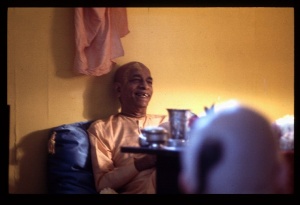CC Madhya 24.207 (1975): Difference between revisions
(Vanibot #0027: CCMirror - Mirror CC's 1996 edition to form a basis for 1975) |
(Vanibot #0020: VersionCompareLinker - added a link to the Version Compare feature) |
||
| Line 2: | Line 2: | ||
<div style="float:left">'''[[Sri Caitanya-caritamrta (1975)|Śrī Caitanya-caritāmṛta (1975)]] - [[CC Madhya (1975)|Madhya-līlā]] - [[CC Madhya 24 (1975)|Chapter 24: The Sixty-One Explanations of the Atmārāma Verse]]'''</div> | <div style="float:left">'''[[Sri Caitanya-caritamrta (1975)|Śrī Caitanya-caritāmṛta (1975)]] - [[CC Madhya (1975)|Madhya-līlā]] - [[CC Madhya 24 (1975)|Chapter 24: The Sixty-One Explanations of the Atmārāma Verse]]'''</div> | ||
<div style="float:right">[[File:Go-previous.png|link=CC Madhya 24.206 (1975)|Madhya-līlā 24.206]] '''[[CC Madhya 24.206 (1975)|Madhya-līlā 24.206]] - [[CC Madhya 24.208 (1975)|Madhya-līlā 24.208]]''' [[File:Go-next.png|link=CC Madhya 24.208 (1975)|Madhya-līlā 24.208]]</div> | <div style="float:right">[[File:Go-previous.png|link=CC Madhya 24.206 (1975)|Madhya-līlā 24.206]] '''[[CC Madhya 24.206 (1975)|Madhya-līlā 24.206]] - [[CC Madhya 24.208 (1975)|Madhya-līlā 24.208]]''' [[File:Go-next.png|link=CC Madhya 24.208 (1975)|Madhya-līlā 24.208]]</div> | ||
{{CompareVersions|CC|Madhya 24.207|CC 1975|CC 1996}} | |||
{{RandomImage}} | {{RandomImage}} | ||
==== TEXT 207 ==== | ==== TEXT 207 ==== | ||
<div class="verse"> | <div class="verse"> | ||
:gā gopakair | :gā gopakair anuvanaṁ nayator udāra- | ||
:veṇu-svanaiḥ kala-padais tanu-bhṛtsu sakhyaḥ | :veṇu-svanaiḥ kala-padais tanu-bhṛtsu sakhyaḥ | ||
:aspandanaṁ gatimatāṁ pulakas tarūṇāṁ | :aspandanaṁ gatimatāṁ pulakas tarūṇāṁ | ||
| Line 20: | Line 19: | ||
<div class="synonyms"> | <div class="synonyms"> | ||
gāḥ—the cows; gopakaiḥ—with the cowherd boys; | gāḥ—the cows; gopakaiḥ—with the cowherd boys; anuvanam—to each forest; nayatoḥ—leading; udāra—very liberal; veṇu-svanaiḥ—by the vibrations of the flutes; kala-padaiḥ—having sweet tones; tanu-bhṛtsu—among the living entities; sakhyaḥ—O friends; aspandanam—the lack of movement; gatimatām—of those living entities that can move; pulakaḥ—the ecstatic jubilation; tarūṇām—of the otherwise nonmoving trees; niryoga-pāśa—the ropes for binding the rear legs of the cows; kṛta-lakṣaṇayoḥ—of those two (Kṛṣṇa and Balarāma), who are characterized by; vicitram—wonderful. | ||
</div> | </div> | ||
| Line 27: | Line 26: | ||
<div class="translation"> | <div class="translation"> | ||
" 'My dear friend, both Kṛṣṇa and Balarāma are passing through the forest leading Their cows with Their cowherd boy friends. They both carry ropes with which, at the time of milking, They bind the rear legs of the cows. When They play on Their flutes, all moving living entities are stunned, and nonmoving living entities experience ecstatic jubilation by Their sweet music. All these things are certainly very wonderful.' | |||
</div> | </div> | ||
| Line 34: | Line 33: | ||
<div class="purport"> | <div class="purport"> | ||
This is a quotation from Śrīmad-Bhāgavatam ( | This is a quotation from Śrīmad-Bhāgavatam (10.21.19). All the gopīs were very attracted to Kṛṣṇa when they saw Him wandering in the forest with Baladeva. They thus praised the Lord's activities. | ||
</div> | </div> | ||
Latest revision as of 15:21, 27 January 2020

A.C. Bhaktivedanta Swami Prabhupada
TEXT 207
- gā gopakair anuvanaṁ nayator udāra-
- veṇu-svanaiḥ kala-padais tanu-bhṛtsu sakhyaḥ
- aspandanaṁ gatimatāṁ pulakas tarūṇāṁ
- niryoga-pāśa-kṛta-lakṣaṇayor vicitram
SYNONYMS
gāḥ—the cows; gopakaiḥ—with the cowherd boys; anuvanam—to each forest; nayatoḥ—leading; udāra—very liberal; veṇu-svanaiḥ—by the vibrations of the flutes; kala-padaiḥ—having sweet tones; tanu-bhṛtsu—among the living entities; sakhyaḥ—O friends; aspandanam—the lack of movement; gatimatām—of those living entities that can move; pulakaḥ—the ecstatic jubilation; tarūṇām—of the otherwise nonmoving trees; niryoga-pāśa—the ropes for binding the rear legs of the cows; kṛta-lakṣaṇayoḥ—of those two (Kṛṣṇa and Balarāma), who are characterized by; vicitram—wonderful.
TRANSLATION
" 'My dear friend, both Kṛṣṇa and Balarāma are passing through the forest leading Their cows with Their cowherd boy friends. They both carry ropes with which, at the time of milking, They bind the rear legs of the cows. When They play on Their flutes, all moving living entities are stunned, and nonmoving living entities experience ecstatic jubilation by Their sweet music. All these things are certainly very wonderful.'
PURPORT
This is a quotation from Śrīmad-Bhāgavatam (10.21.19). All the gopīs were very attracted to Kṛṣṇa when they saw Him wandering in the forest with Baladeva. They thus praised the Lord's activities.